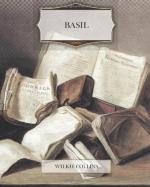Trite and common-place though it be, I mention this circumstance attending my introduction to college, because it formed the first cause which tended to diminish my faith in the institution to which I was attached. I soon grew to regard my university training as a sort of necessary evil, to be patiently submitted to. I read for no honours, and joined no particular set of men. I studied the literature of France, Italy, and Germany; just kept up my classical knowledge sufficiently to take my degree; and left college with no other reputation than a reputation for indolence and reserve.
When I returned home, it was thought necessary, as I was a younger son, and could inherit none of the landed property of the family, except in the case of my brother’s dying without children, that I should belong to a profession. My father had the patronage of some valuable “livings,” and good interest with more than one member of the government. The church, the army, the navy, and, in the last instance, the bar, were offered me to choose from. I selected the last.
My father appeared to be a little astonished at my choice; but he made no remark on it, except simply telling me not to forget that the bar was a good stepping-stone to parliament. My real ambition, however, was, not to make a name in parliament, but a name in literature. I had already engaged myself in the hard, but glorious service of the pen; and I was determined to persevere. The profession which offered me the greatest facilities for pursuing my project, was the profession which I was ready to prefer. So I chose the bar.
Thus, I entered life under the fairest auspices. Though a younger son, I knew that my father’s wealth, exclusive of his landed property, secured me an independent income far beyond my wants. I had no extravagant habits; no tastes that I could not gratify as soon as formed; no cares or responsibilities of any kind. I might practise my profession or not, just as I chose. I could devote myself wholly and unreservedly to literature, knowing that, in my case, the struggle for fame could never be identical—terribly, though gloriously identical—with the struggle for bread. For me, the morning sunshine of life was sunshine without a cloud!
I might attempt, in this place, to sketch my own character as it was at that time. But what man can say—I will sound the depth of my own vices, and measure the height of my own virtues; and be as good as his word? We can neither know nor judge ourselves; others may judge, but cannot know us: God alone judges and knows too. Let my character appear—as far as any human character can appear in its integrity, in this world—in my actions, when I describe the one eventful passage in my life which forms the basis of this narrative. In the mean time, it is first necessary that I should say more about the members of my family. Two of them, at least, will be found important to the progress of events in these pages. I make no attempt to judge their characters: I only describe them—whether rightly or wrongly, I know not—as they appeared to me.




